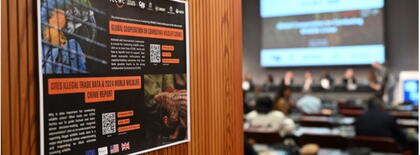 The Senior Experts Group of the International Consortium on Combating Wildlife Crime (ICCWC) met in Geneva last week to discuss progress with its collaborative activities to combat wildlife crime.
The Senior Experts Group of the International Consortium on Combating Wildlife Crime (ICCWC) met in Geneva last week to discuss progress with its collaborative activities to combat wildlife crime.
Opened by Mr. John E. Scanlon, Secretary-General of CITES, the meeting provided the opportunity for representatives from the five partners of ICCWC – the CITES Secretariat, INTERPOL, UN Office on Drugs and Crime (UNODC), World Bank and the World Customs Organization – to discuss the current and future work programme of ICCWC.
ICCWC activities under discussion included the roll-out of the ICCWC Wildlife and Forest Crime Analytic Toolkit to evaluate national responses to wildlife crime, upcoming investigative assistance and capacity-building support being provided to national governments by ICCWC, and guidelines for the use of DNA sampling for ivory that are being finalized by UNODC on behalf of ICCWC. Experts also discussed the future priorities to deliver the ICCWC Strategic Mission 2014-2016 including those activities that require external funding.
The ICCWC meeting followed the 65th meeting of the CITES Standing Committee that took place in Geneva in July 2014 and at which a number of recommendations to combat illegal wildlife trade were adopted. The Senior Experts Group was briefed on the Standing Committee’s recommendations to a number of African and Asian countries to develop national ivory action plans, and discussed how ICCWC activities could support the implementation of these plans once developed.
ICCWC was established in November 2010 to provide coordinated support to national enforcement agencies and regional enforcement networks in their efforts to combat wildlife crime. The ICCWC Senior Experts Group meets three times a year.



